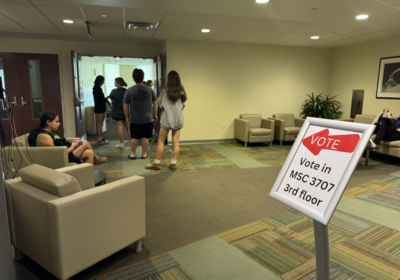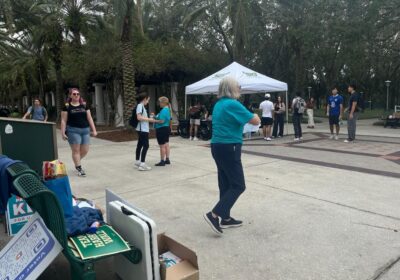On-campus political groups split on bill targeting diversity initiatives

Student-led political groups on campus have presented differing opinions and action plans regarding House Bill 999, which targets diversity, equity and inclusion (DEI) and critical race theory (CRT) initiatives at the state’s public universities.
House Bill 999, which passed through the Florida state house on March 13, aims to prohibit state colleges and universities from using funds to “promote, support or maintain any programs or campus activities that espouse diversity, equity, or inclusion (DEI) or critical race theory (CRT) rhetoric,” according to the Florida Senate.
The state’s Board of Governors are also given the ability to remove “any major or minor in CRT, gender studies, intersectionality or any derivative major or minor of these belief systems.”
Andrew Davis, vice president of USF College Republicans, said he supports the bill. Davis said DEI pushes straight, white students away from academic programs on campus.
“Diversity inherently is not a bad thing,” Davis said. “But racism is masquerading as DEI by pushing out white students from participation in things their taxes or student fees pay for.”
Davis said the bill will have a positive impact on Floridian students. He said students would be able to come to school and participate in the programs on campus regardless of their physical characteristics.
Davis also said those who oppose the bill have incorrect talking points of what will and will not be banned.
“There’s no language in the bill that specifically bans [black fraternities or sororities]”, he said. “[People] are expanding upon what it is and applying it to other situations, but that’s obviously not the purpose or impact of the bill.”
President of USF College Democrats Jonathon Chavez said he is concerned about how the bill will affect student organizations.
“One of the big issues that we’ve been facing here that we really haven’t gotten that much respite on is the student organization situation,” Chavez said. “In the first draft, that was extremely unclear, and that was one of the largest protests that was raised about it.”
Chavez said student organizations are at risk of being prevented from freely organizing. He also said removing certain majors and minors will disenfranchise students interested in pursuing those degrees.
“What if you’re a senior next semester and it’s supposed to be your last and suddenly your degree disappears?” he said. “Our Women’s and Gender Studies department just turned 50 years old not that long ago. So those students as early as next semester can be told that ‘Yeah, this degree that you’re pursuing, it doesn’t exist anymore.’”
The amount of federal grants awarded to USF will also be affected, according to Chavez. He said that when our state laws go against federal trends, USF will not be a priority for grants.
“A lot of international students find our campuses very desirable. And if Florida law kind of restricts the attractiveness, it [will prevent] us to get those research grants or for us to get those international students,” Chavez said.
“Everyone suffers. That’s less tuition money for the school to spend.”
Will Mleczko, vice president of Students for Socialism at USF, said DEI initiatives and CRT education on campus are crucial in building an informed society.
“Oftentimes, it’s just the teaching of what has happened in the past to marginalized groups like colonialism or slavery,” Mleczko said. “These are [the teachings] that you want in an educated society.”
Mleczko also echoed Chavez’s fear of student organization busting.
“As a member of Students for Socialism, we kind of threaten our existence as well as all of our allies’ existence,” Mleczko said. “We don’t want to have to feel that the school wants to get rid of us or show us away.”
Chavez said he believes the College Democrats will gain support against the bill through continued activism and by increasing awareness.
“There’s a lot of other issues in that bill, but we’re going to try to be very proactive and utilize our student governments,” he said. “[We need] proactive action and statements ahead of time to say that we don’t really stand for this. We’re going to do our best to mitigate what we are certain will be harmful effects.”
Aleyda Matamoros, a member of the USF College Republicans, said she advocates for the termination of CRT measures and was part of a roundtable discussion regarding DEI with Gov. Ron DeSantis on March 13.
During the discussion, DeSantis accused state universities of underreporting spending on DEI initiatives. Alongside the panelists, he said diversity initiatives were indoctrination and signified a lowering of standards, according to a March 13 Tampa Bay Times article.
Matamoros said the elimination of these programs will hopefully turn around certain societal notions.
“It cuts out the DEI programs on campus, which reduces spending,” Matamoros said. “And [CRT] very much leads to this one victimhood mentality. I hate the idea that just because of my race or gender, I am a victim based off society.”
Matamoros said eliminating CRT in schools would help reduce the idea that white people should suffer for historical wrongs.
“People are now pointing fingers to white and traditionally American people and saying it’s all their fault,” she said. “Don’t get me wrong, I definitely think we should look at what happened and be like ‘[Slavery] was something that happened,’ but we’re past that.”
The College Republicans partnered with the governor’s office and other conservative institutions to hold events and market on social media, according to Davis.
“Luckily, it’s much easier for us to do that in Florida because we have DeSantis,” Davis said. “He hit the nail right.”







